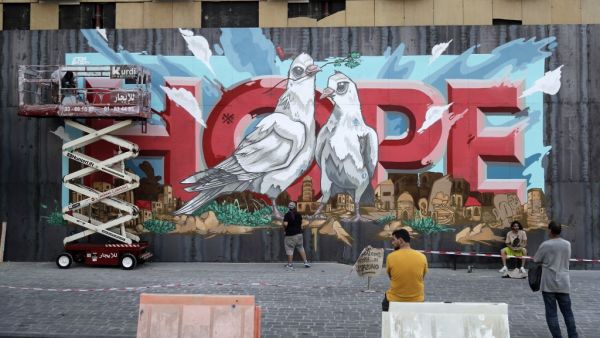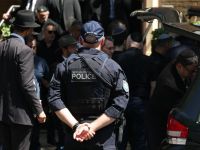“You travel to cities around the world and you see the harbors are a place where you can walk, go sight-seeing, meet people. Beirut Port is a secretive place we never had any connection with.”
Rima Mismar smiles humorlessly. “After the blast my kids were asking, ‘Mum, where we are going when we pass by the Port? To the Bekaa or ...?”
This day a team of workmen are busily reassembling the offices of the Arab Fund for Arts and Culture, where Mismar is director. Situated just off the Gemmayzeh Steps (aka “Daraj al-Fan”), AFAC was among the Beirut art institutions wrecked by the Beirut Port explosion.
At the end of July AFAC and Mawred al-Thaqafi (Culture Resource) announced the recipients of their first collaboration – the Solidarity Fund for Arts and Culture Structures in Lebanon. The organizations provided emergency funds to allow 23 institutions to sustain themselves in an environment depleted first by economic collapse, then by COVID-19.
“We were trying to deal with this reality, out of our concern for the whole sector that’s been abandoned,” Mismar says, “in the absence of any kind of public sector movement or interest in playing a role. Now, with this explosion, we’re getting into an emergency within an emergency within an emergency.”
When the 4 August blast rocked northern Beirut, it was obvious AFAC and Al-Mawred had to revisit the Solidarity Fund.
“Based on discussions between the two organisations and with the wider arts and culture community,” she says, “we felt the urge right now is to support individual artists, technicians and cultural practitioners because they’re super vulnerable at this time.
“They need a bit of support to be able to think about what their losses are – to have a plastic sheet on the window, to replace the glass or a broken laptop. Then they might be able to assess the damage.
“For the next round, we hope to be able to support organisations, spaces, venues. In both support schemes we’re looking at people who are directly impacted by the explosion –physical injuries, damaged houses, work spaces, studios, equipment. These are the priorities that we’ll be able to attend to.
“We have a preliminary list of around 200 artists that we know have been impacted but we still have to see. So we’re gonna have to do an open call, to see what their needs are and how much we can support them.
“Right now the grant would be $2,000-5,000. Depending on the numbers and their needs, we’ll have a better understanding of how many we can support and how much per individual grant.”
Since the Beirut Port blast, conversation tends to veer back to what people were doing around 6 p.m. on Aug. 4. Mismar is preoccupied by the matter.
“I don’t know what it means,” she says. “I’m fighting any urge to celebrate surviving it. That’s the last thing we should be doing. I really can’t find any kind of solace in this, only in the questions I’ve been asking myself and my friends around me ... What can we do? What are our options now, after all of our illusions that we’ve been living these last years have [been burst].
“I’m unable to draw any conclusions or even analysis except that, at this point, I feel that there’s something that we’ve lost forever ... There’s no point of going back to anywhere, because now we know that what we were living was an illusion.
“It’s a very strange place to be in. we can’t look backwards, because there’s nothing that we can hang onto. Looking forward is very hard and foggy at the moment. We’re being suspended somehow.”
She says the blast has made her interrogate the role of an organisation like AFAC.
“We aspire to support creative expression in its criticality, with the questions it poses, the potential for dialogue that it creates in terms of discussing complex topics that re-image our relationship to the past, to the present, to the public sphere. As an organization that wants to support artistic and cultural work in the region, this is what we aspire to.
“Then you find yourself swallowed within this catastrophe mode, going back to the very basics of ensuring that people are safe, that they have roofs over their heads.
“It’s a dilemma. If we don’t make this kind of intervention at times like these, our strategic vision itself is threatened. If this sector, those organizations, those people are unable to hold on and stick together, then we can kiss good-bye any role they can play in reshaping or rethinking our societies.
“This intervention we’re doing now with Al-Mawred does not suggest that we can fill the gap caused by the absence of any government initiative, in the absence of cultural policies. We can’t do that. It’s not our role, and it’s not within our abilities, our finances or human resources.
“But not making this emergency support means that there’s a whole community that just might lose its raison d’etre, that might be unable to stand up for the different injustices that they usually discuss in their works.
“It’s not about taking the place of what should be done at the level of the government, not about lightening the state’s responsibilities and accountability. It’s just about doing what we can do for this sector that has always been built on individual initiatives and the work of small collectives.”
The financial support for this phase of the Lebanon Solidarity Fund must come from overseas, since local players that can support the sector have themselves likely been hit by the crises.
“Our sponsors are people from the Arab region and outside who are contributing sums of $50,000-$3,000, online or through bank transfers. Some gestures were extremely touching. One artist who received an AFAC grant last year wanted to return it so it could support someone in greater need.
“This is something that does give you the feeling of community – a network of people who still see meaning in what you’re doing, in acts of solidarity, in the importance of supporting the arts and culture community in this crisis. It really makes you feel you’re not alone.”
This article has been adapted from its original source.







